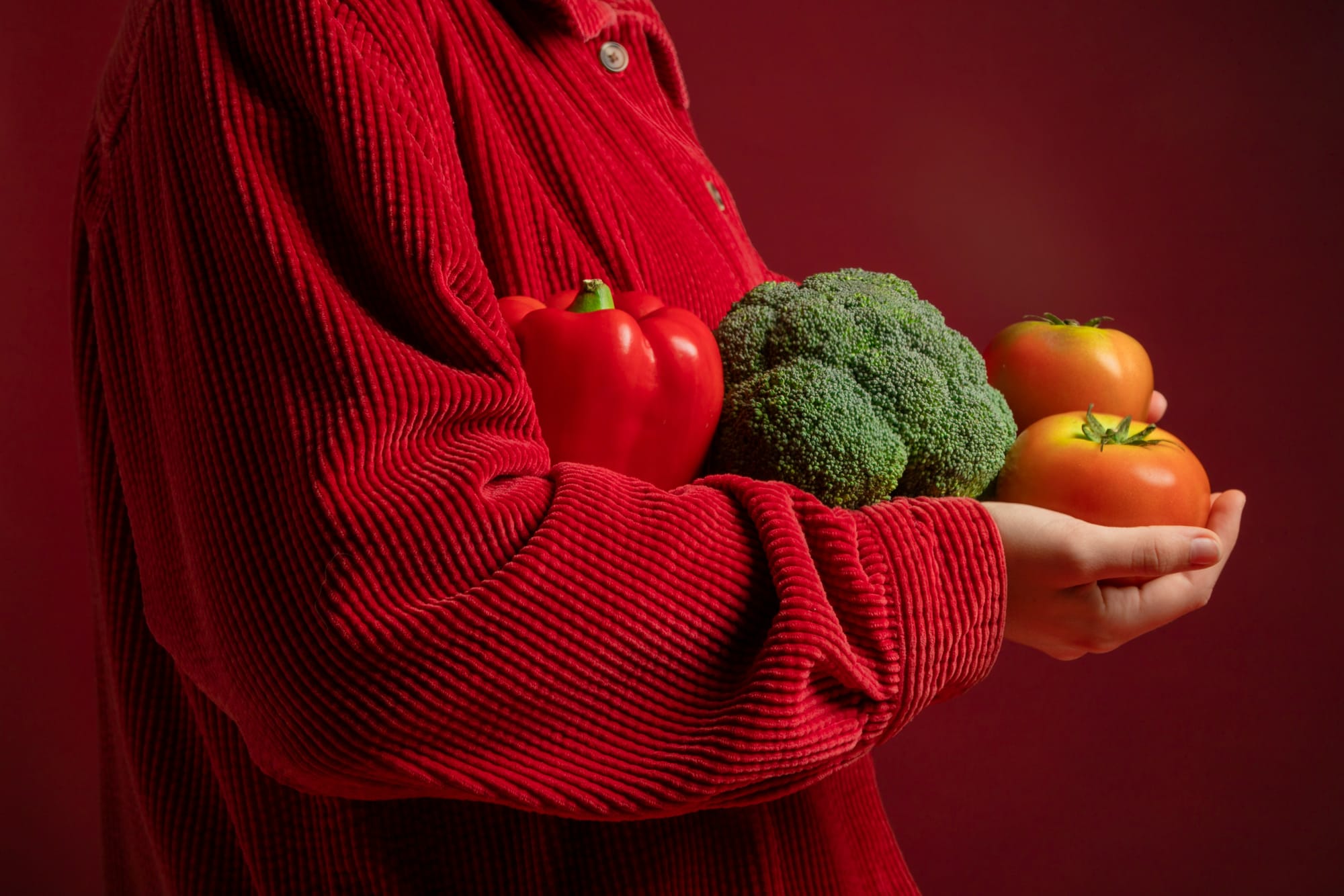A bestselling Paleo author now calls it pseudoscience and misinformation, so why is it still on her website?

Short on time? Read the summary:
→ Sarah Ballantyne, PhD (medical biophysics), is a bestselling author of Paleo books and Nutrivore, a food-scoring dietary philosophy.
→ Ballantyne has described Paleo and her former work as misinformation and pseudoscience but maintains an online presence on her Paleo-focused website.
→ Criticisms include the development of a food-scoring system by someone without doctoral expertise in nutrition biochemistry and the fact that the plan contains elements similar to other diets.
→ Nutrivore takes a much less restrictive approach to food than the author's previous works, which could benefit readers who want to transition out of more restrictive dietary approaches. However, Nutrivore also has qualities that are consistent with a dietary approach that could contribute to orthorexia (a disordered eating pattern that focuses extensively on healthy food and food quality).
→ Whether they claim to be diet books or not, food-related books will always have the potential to be polarizing. Readers may gravitate to an author’s personal story or platform, which makes it hard to objectively consider nutrition-related or dietary advice (and whether someone is genuinely qualified to dispense it). They may also seek to replicate the author’s personal experience, which isn’t possible given the unique nature of each person’s health, genetics, diet, and social environment.
→ Readers need to be aware that most books published for a mainstream audience are not peer-reviewed or fact-checked. They may contain anecdotes and reader success stories, but these are not equivalent to results from clinical trials. They may use many references, but citation volume alone does not make a work more rigorous.
→ Diet, nutrition, health, and wellness content is emotionally charged, regardless of the perspective it comes from. But every book, article, and social media post includes direct or indirect disclaimers that what you’re reading isn’t personal or medical advice. No author or online wellness professional will assume responsibility for negative effects. For the same reason, more caution and critical thinking are warranted before giving authors or influencers credit for positive effects.
→ The scientific process should allow for the development of new or shifting views in light of new evidence; experts should be given flexibility to communicate updated stances rooted in new research. The primary confusion and critique regarding the Paleo-Mom-to-Nutrivore shift is that both messages still exist simultaneously in print and online, years after the author began to view the earlier work as misinformation. Without substantially more transparent messaging on the website, Nutrivore and the Paleo Mom appear to be concurrent, complementary platforms, not a 180º shift. Maintaining a foot in both worlds could lead to concerns that business needs and revenue take precedence over remedying misinformation.
→ Ballantyne clarified her planned 1-2 year process for taking down the content she has identified as pseudoscience and linked it to limitations within her current team’s capacity of six members. But when an author has self-identified their content as misinformation, it raises questions about why a more direct mode of content takedown would not be applied.
→ In the current content landscape, misinformation is abundant. Much of it is perpetuated by people who may be unaware of the inaccuracies. When a scientist and bestselling author identifies their own misinformation, but does not rigorously and rapidly retract it, it is understandable that others in science communications, academic research, or healthcare might issue questions and concerns.
Sarah Ballantyne, who holds a PhD in medical biophysics, is one of the bestselling authors in the Paleo space. Her first four books, all focusing on a Paleo way of eating, were published between 2013 and 2017. They're still currently top sellers on Amazon.
In 2011, Ballantyne launched her website and brand as The Paleo Mom and quickly became one of the leading voices in the Paleo community.1 Her first book, The Paleo Approach, was published in 2013 and detailed a series of modifications to a general Paleo diet to address “the root cause of autoimmune disease.” While Loren Cordain, PhD, and Robb Wolf initially conceptualized the autoimmune Paleo diet, Ballantyne created a robust, multi-phase plan and turned it into a marketable product linked with her platform. Autoimmune Paleo became known as AIP, with several spinoff cookbooks, health guides, and protocols from other authors.
Over time, views within the Paleo community, including Ballantyne's, have evolved. But while Ballantyne has called it pseudoscience, AIP remains a popular therapeutic dietary approach. A few clinical trials were done, which, despite being small and uncontrolled, dramatically enhanced the perceived legitimacy of AIP.2,3 It gained traction within the world of complementary, alternative, and functional medicine and is still frequently recommended for autoimmune disorders, chronic illness, and some disabling conditions.
In recent years, Ballantyne has, in some ways, distanced herself from Paleo and AIP. In a May 2024 appearance on the Unbiased Science podcast, the host referred to Ballantyne as "previously known as the Paleo Mom" who underwent a 180-degree shift from Paleo to a new approach called Nutrivore.4 In that interview, Ballantyne referred to her previous Paleo and AIP work with words like "misinformation" and "pseudoscience."
Formerly known as?
The Unbiased Science podcast conversation spanned Ballantyne’s medical biophysics research background as well as the personal health factors that drew her in to Paleo. She described having felt misled by science communicators who promoted Paleo, while acknowledging that her science background is likely what helped her build such a huge platform as a Paleo expert. She referred to herself as a “zealot” back then, for having viewed Paleo as a “solution for everything.”
Ballantyne’s shift from Paleo didn’t happen instantly. She described a process over years of research, where various tweaks and changes came into view. She talked about building her new project, Nutrivore, while also working on her Paleo Mom projects.
Ballantyne’s new direction and food philosophy was published in May this year as Nutrivore: The Radical New Science for Getting the Nutrients You Need from the Food You Eat, the same month as her appearance on the Unbiased Science podcast. She has since appeared on several other podcasts, sharing various aspects of Nutrivore and her nutrient profiling approach. (This isn't, however, new, and she is not the first author to suggest that people need to get all the nutrients they need from food alone.)
Ballantyne now maintains an online presence at a website of the same name, Nutrivore. She is active on most social media platforms, regularly publishes a newsletter, and runs a Patreon community where paid members have access to a podcast and other resources.
While Ballantyne seems future-forward with Nutrivore, the Paleo Mom remains a present-tense project. The original website is still active and, until this afternoon, had no notice that the content on the site was no longer consistent with Ballantyne's current views. The website still has an active store that sells courses and eBooks.
After several requests for comment, Ballantyne did respond to Factual Wellness via email. When asked about the ongoing activity of the website, marketing emails, and store at The Paleo Mom, she replied:
"My approach to archiving the old website is the same as my approach to bringing my social media audience and newsletter subscribers along for the transition to evidence-based with me, because I am passionate about reaching people who don’t already agree with me and who are trapped in the logical fallacies that I also used to believe.
My team and I are working to dismantle the old website piece by piece, moving evidence-based content to Nutrivore while creating canonical URLs on articles that don’t meet my current standards to forward search engine traffic to the evidence-based articles on Nutrivore. This is the organic traffic version of what I did on social media and my newsletter. There’s 10 years of content to go through, so this is a time-consuming job that I expect to take another year or two to complete.
We are taking a data-driven approach, prioritizing articles that will move the most organic traffic. If anyone would like to support our efforts to archive the old website (which would go faster if I could afford to hire a person or two to do this job full time), I invite them to join my Patreon. With each piece of content that disappears off the old site to be replaced by a rigorous article on Nutrivore (like my recent 12,000 word article busting vegetable oil myths), the old website slowly dies—and, it’s working, it gets only about 5% of the traffic that it did in its hayday—even the old email funnels land people onto the Nutrivore Newsletter upon completion. In fact, the only time we see a spike in traffic on the old site is when someone publicly complains that it’s still up. I don’t talk about the site (other than to address complaints like this one), nor do I direct traffic to the old site in my newsletter or on social media."
But that still leaves the question: Why keep the website up at all? Ballantyne did not respond to questions about why the store remains active. In a recent podcast appearance, she described one of her self-published books and added, “Don’t buy it,”5 which compels the question: Why have it for sale?
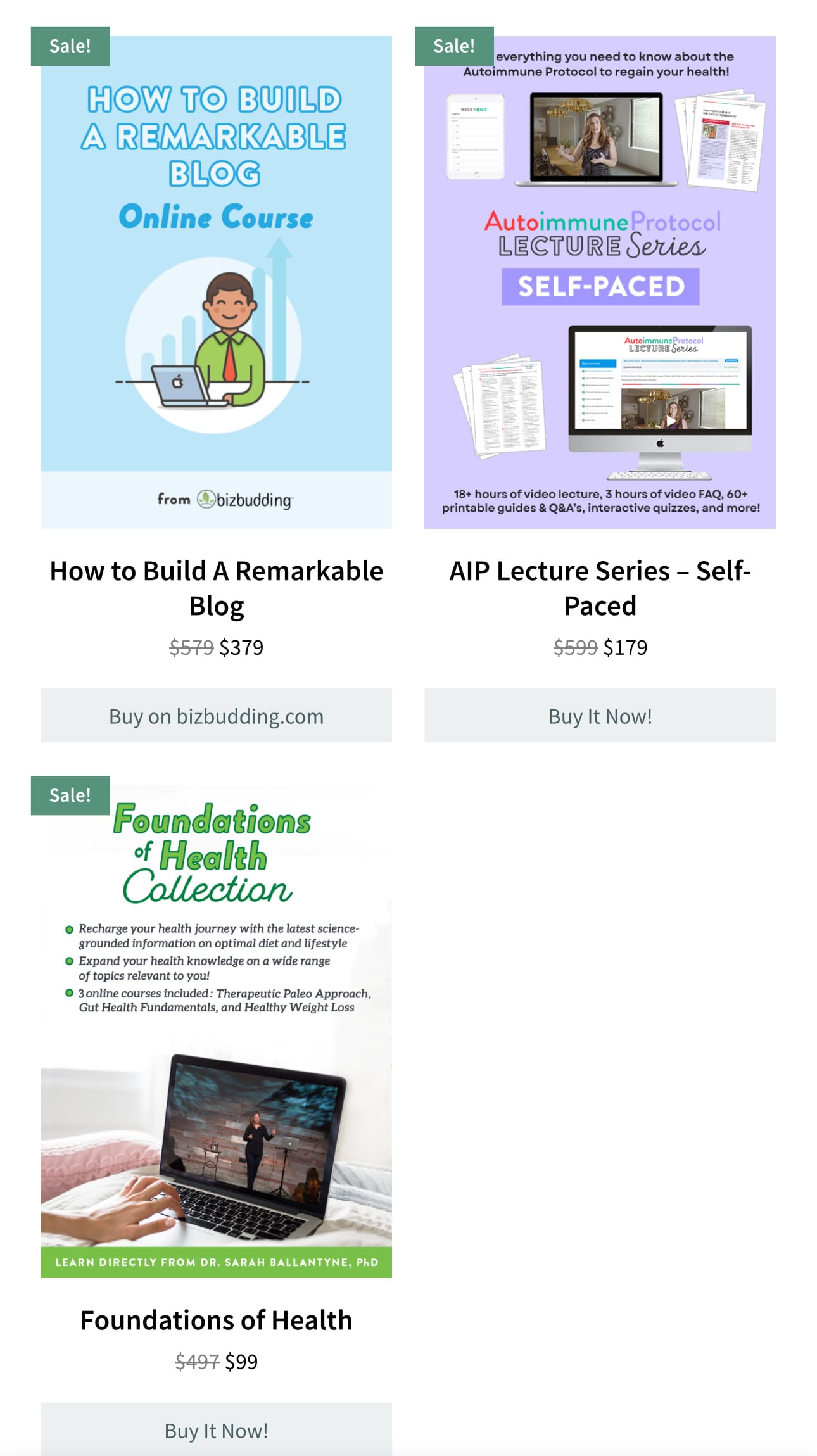
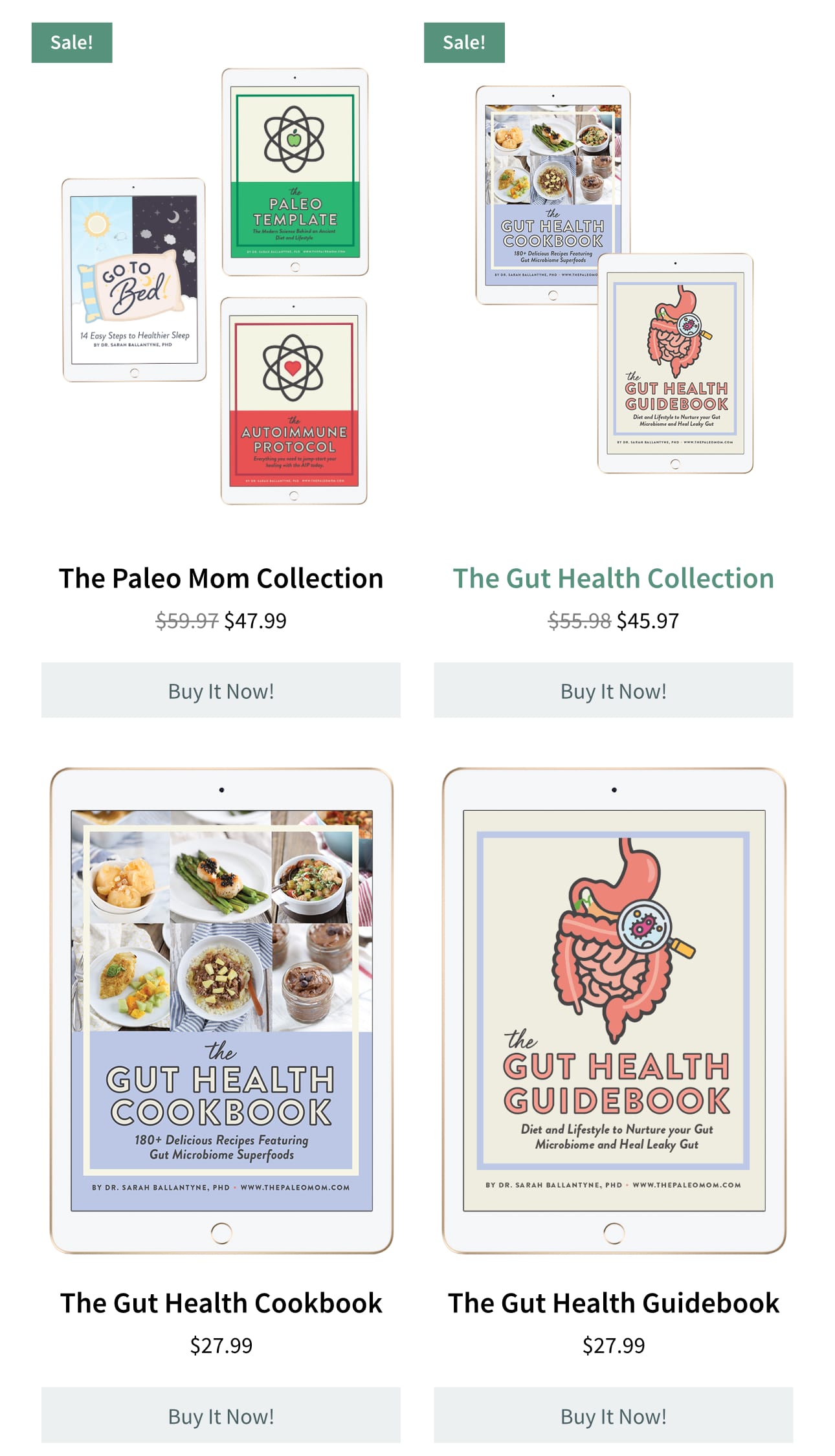
Given the nature of her self-report that she had previously written and dispensed restrictive pseudoscience and misinformation, I asked Ballantyne if the burden for correcting that information fell to her or her potential readers? I noted that while she had repeatedly expressed remorse at having spread incorrect information, a lengthy transition from her old website and messaging could leave readers open to discovering her former work with no idea that the author no longer endorses it.
Multiple readers have expressed frustration to Factual Wellness that Ballantyne has not done a more thorough job of communicating that her Paleo Mom website is not her current view. One reader felt as if it has been intentional.
From a business standpoint, perhaps a behind-the-scenes, drawn-out content transfer makes sense to preserve organic traffic. However, readers who are newly diagnosed with autoimmune disorders and sifting the internet for guidance on dietary support deserve to know that the information they encounter is up-to-date. While every consumer should verify health and wellness information before implementing it, that’s not what happens in the real world.
The Paleo Mom website still ranks among top search results, making it likely that searchers will encounter the content. As of now, there is no direct message or disclosure on The Paleo Mom website that the author disclaims Paleo and AIP.
Ballantyne stated that she has discussed her evidence-based transition on podcasts, social media, and newsletters over the last several years. However, not all readers engage with those platforms, and search engines do not index them as thoroughly as websites. It is possible that a reader could find one of Ballantyne’s books in a bookstore or at their library and visit her website for more information without ever encountering social media posts or podcast interviews.
If left to Google alone, even a direct query for "Is Sarah Ballantyne still Paleo?" tells the searcher she is. While people are becoming more aware that AI summaries may be wrong, in this case, the content is drawn from the still-active Paleo Mom website. Search engine indexing and AI summaries won’t intuit that a website shouldn’t be considered relevant for a subject when it contains all the algorithmic signals needed to convey authority.
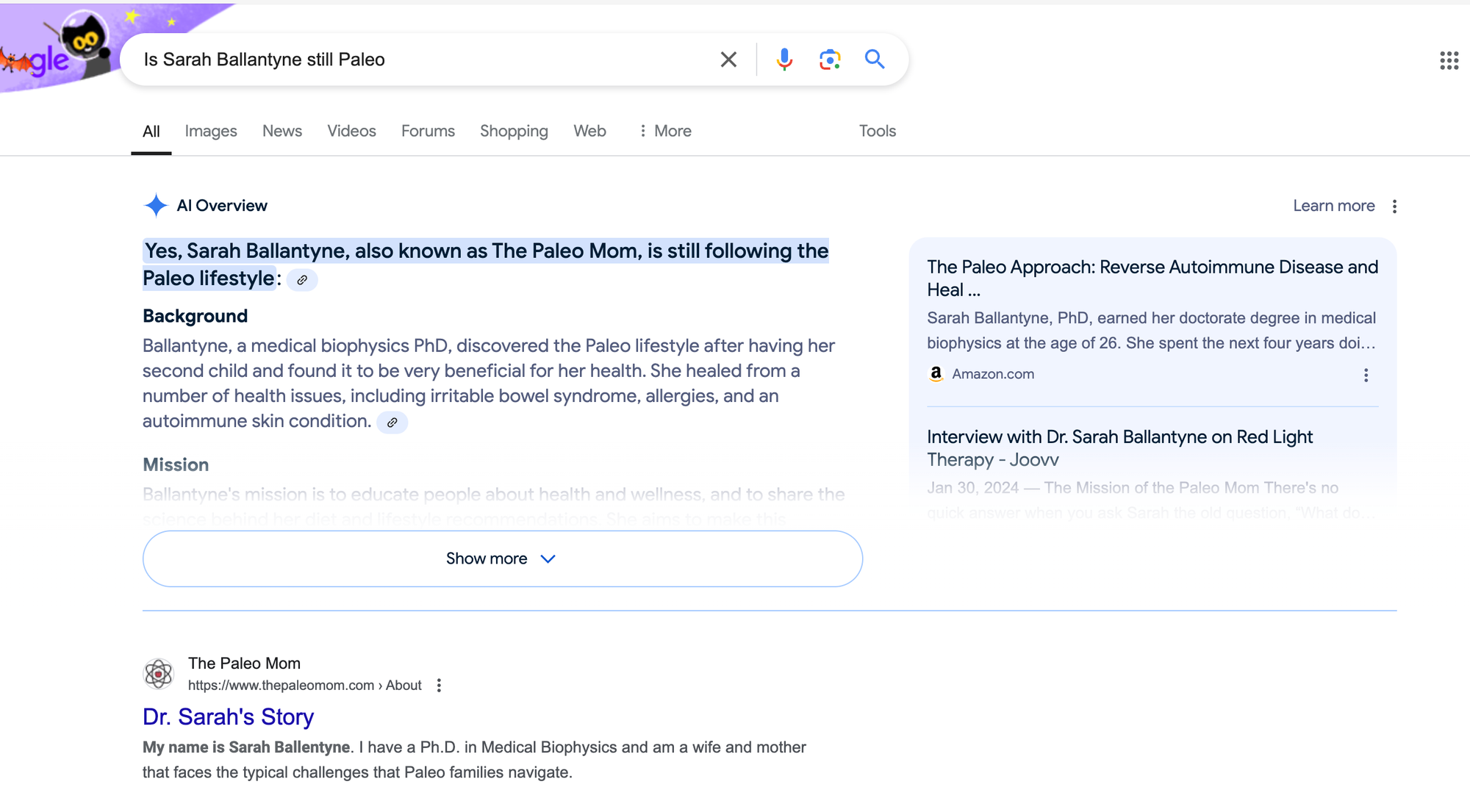
A note is added
After several requests for comment on the lack of a home page caveat regarding the shift in philosophy away from Paleo, I received a response about that as well as an answer to the question about whether Ballantyne felt the burden of correcting misinformation fell on her or the reader. One of her team members replied via email:
"I would hope that Dr. Sarah’s work in the space over the past few years would clearly show she believes the onus is on her. There has been such little traffic it was not something we were concerned about, however you make a great point. I have added a banner and refreshed the old pop up."
The website banner reads, "This site is no longer supported. Keep up with Dr. Sarah's current work here. →"
Before:
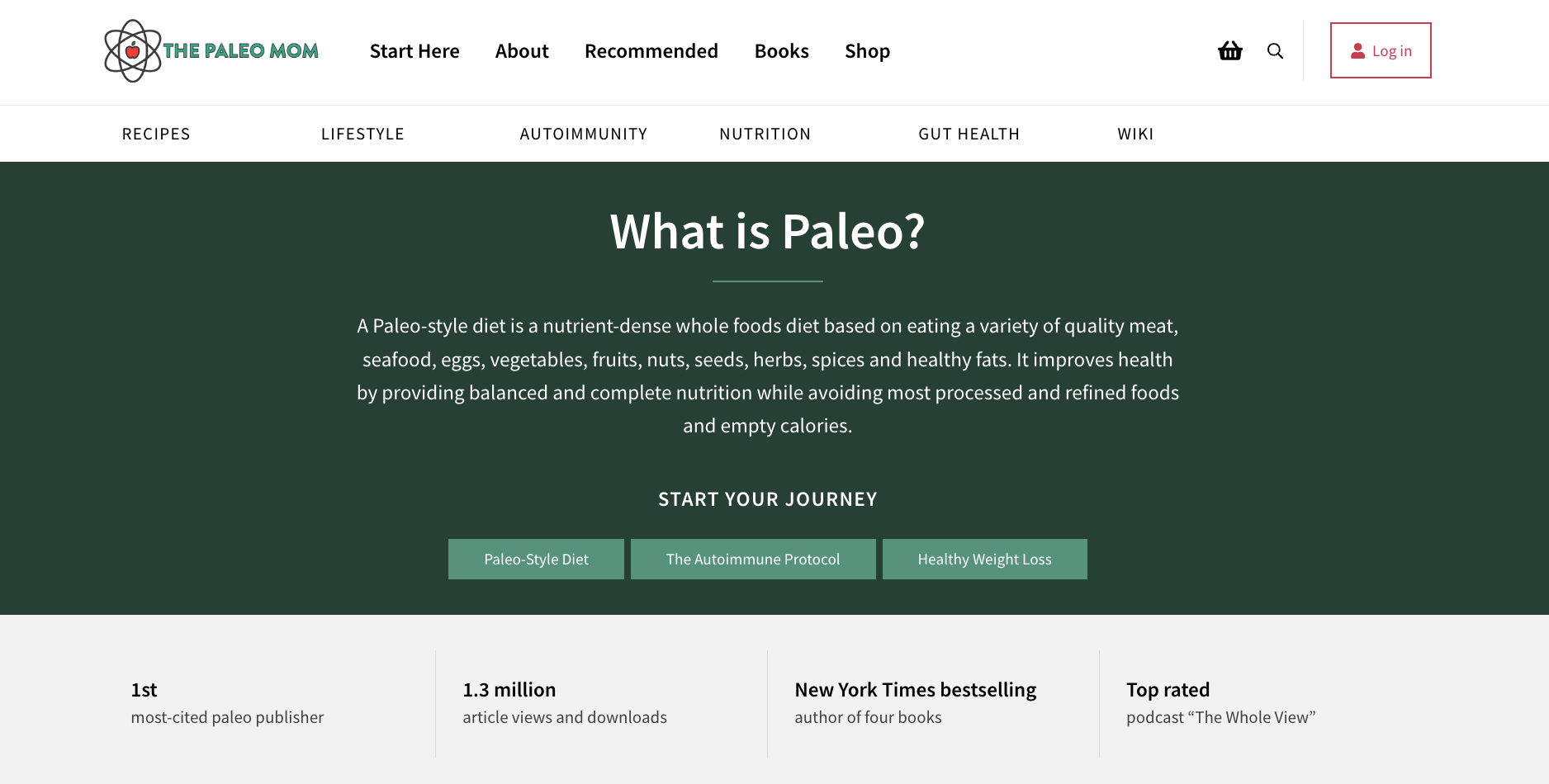
After:
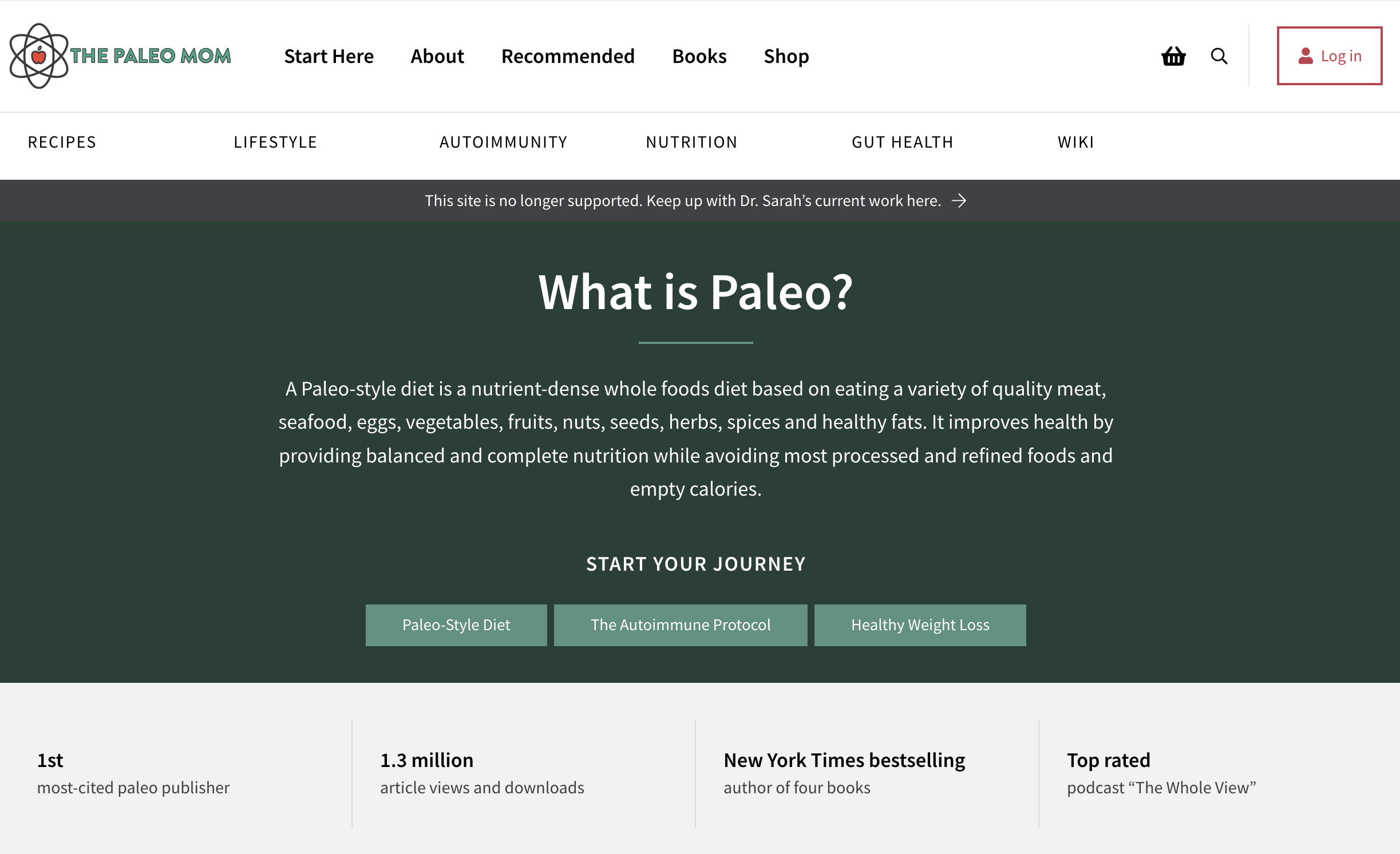
Even so, this notation could be easily overlooked due to the font size and gray-on-green color scheme. It could also be construed to mean that a web developer or team does not support it, not that the author has elsewhere described the content as pseudoscience and misinformation.
Given the still-active web store that sells books and courses, a lack of clarity remains. Why are products being sold when they are rooted in views described by Ballantyne as misinformation and pseudoscience? Even if the store has little traction, why keep it active when a consumer might purchase content no longer endorsed by the author? Similar questions have been posed on social media:
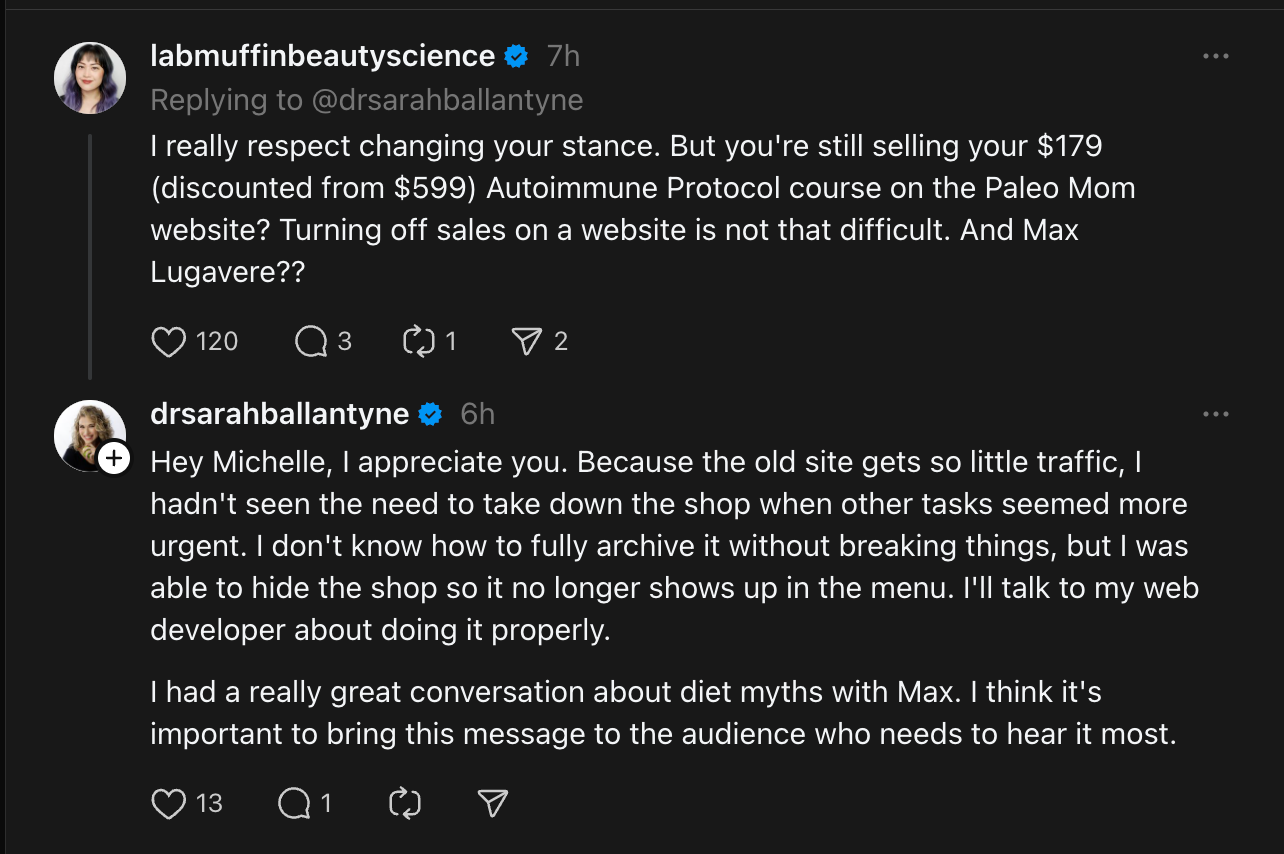
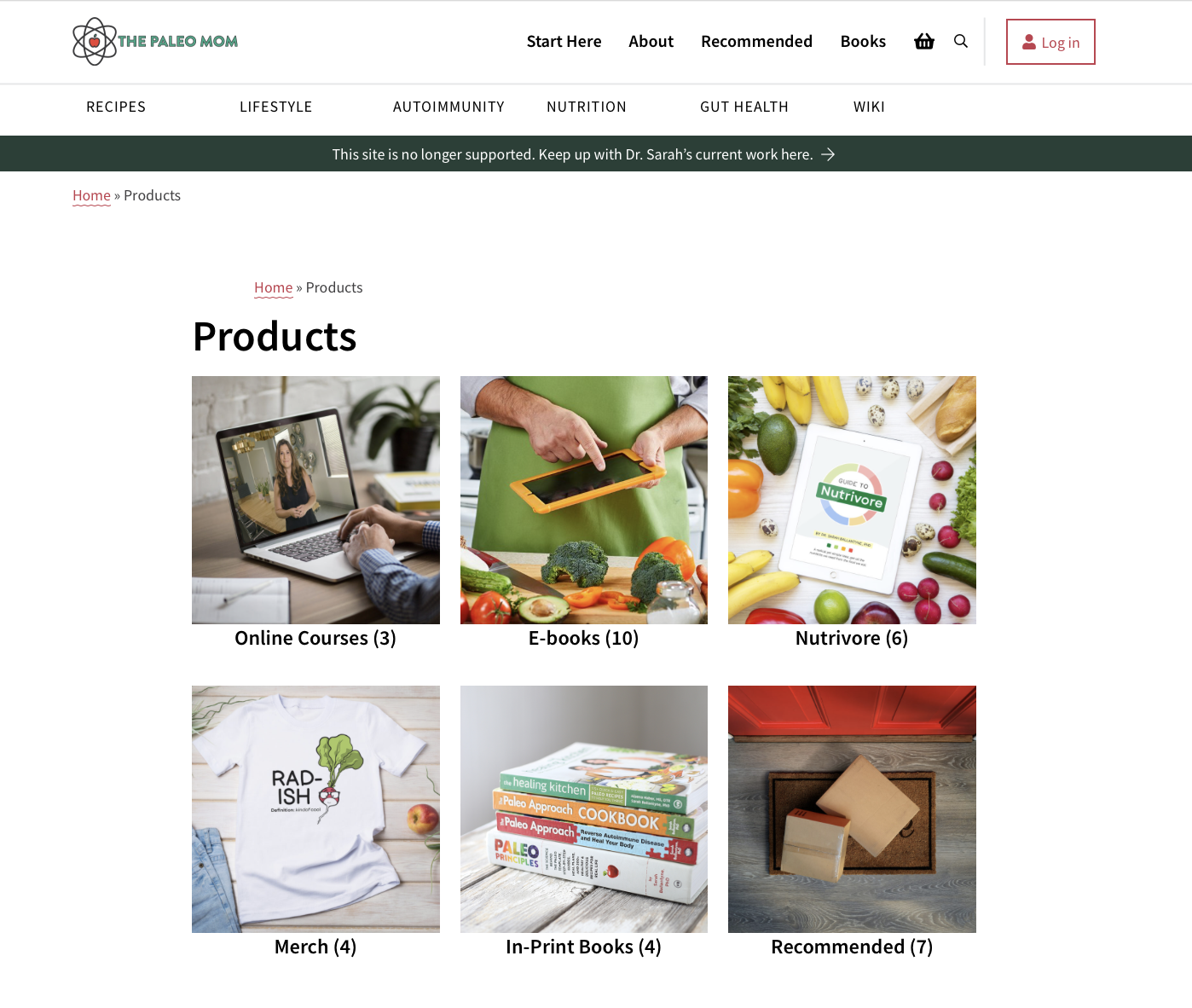
Bestselling Paleo books
Some commenters on social media have asked Ballantyne why her Paleo books are still for sale, but she likely has little control over that. Traditionally published books are under contract with the publisher, and if those books are still in high demand, it's not as simple as asking a publisher to stop making them.
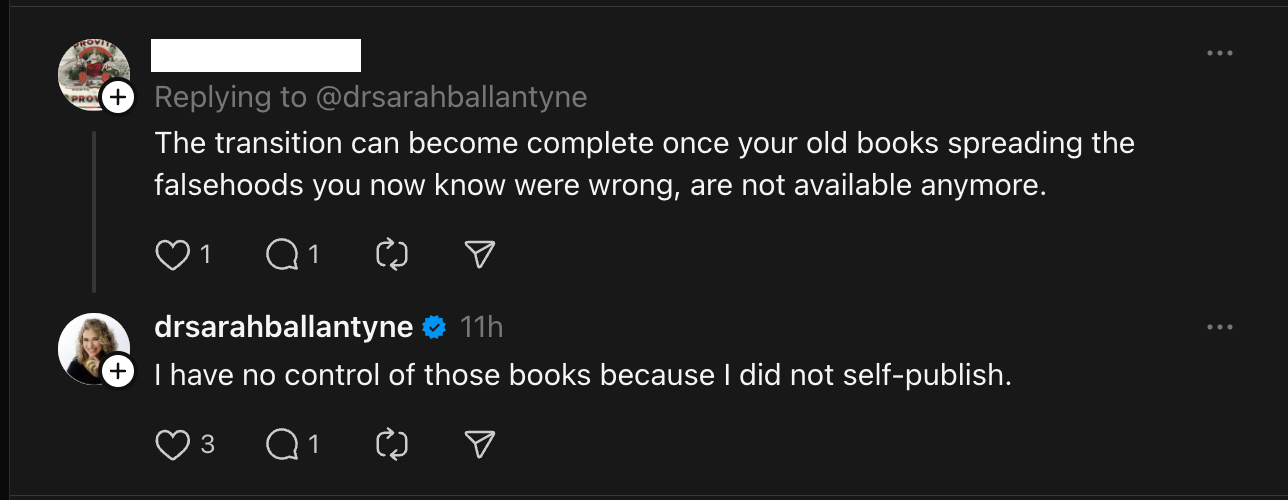
Indeed, Ballantyne's books are still hovering in the bestseller range, according to Amazon sales rankings. While these are typically updated multiple times a day and difficult to track, as of today, The Paleo Approach (2013) was #36 in Paleo Cookbooks, The Healing Kitchen (2015) was #24 in Paleo Cookbooks, and Nutrivore (2024), the non-Paleo book, was #4 on the Paleo Diet list. On Kindle, Nutrivore was also #2 in Weight Loss Food Counters, #4 in Weight Maintenance Diets, and #5 in Weight Loss Diets.
Authors generally do not have a say in their books’ categories for Amazon or other rankings. Ballantyne has stated that her new philosophy is about nourishment, not judgment and that Nutrivore is a food-scoring system, not a diet. She has said she wants to reach her former Paleo audience with her newer, evidence-based message of food freedom, not fear.
Diet or no diet?
Some criticism of Ballantyne's viewpoint shift has focused on the fact that her doctorate isn't in nutrition. In a comment response to Factual Wellness, she said:
"I’m not a nutrition expert, I’m a science communicator on nutrition topics. I have never claimed to be a dietitian or nutritionist, I have never worked with clients 1-on-1 in any capacity, nor given out meal plans. My background is very similar to other prominent science communicators who address diet and health topics."
Still, critics have pointed to the problematic nature of creating a food-scoring system without a research foundation in nutrition biochemistry. As the author of a book that describes a nutritional classification system, it's hard to argue that others don't perceive her as a nutrition expert. At least some of her followers do:
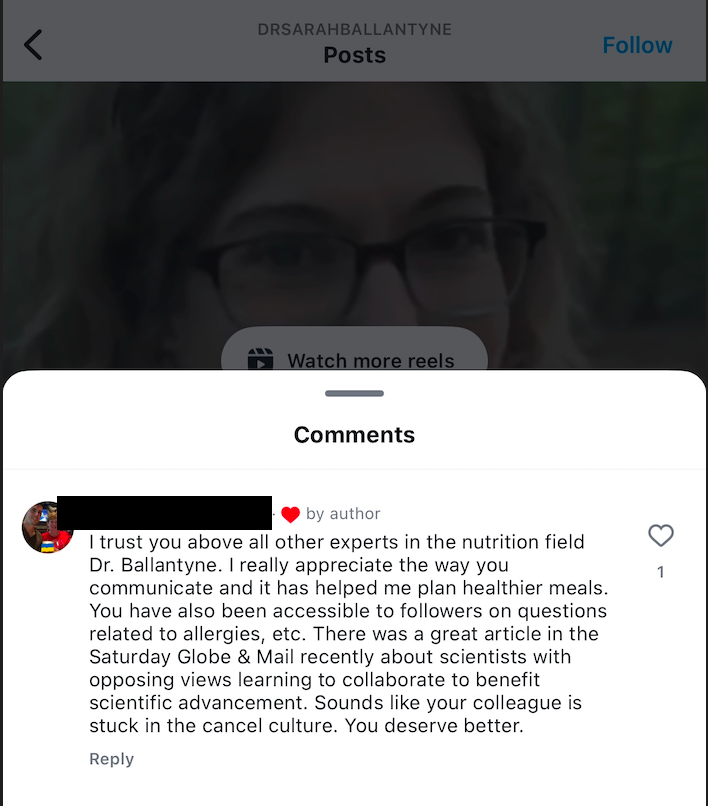
Not a diet
The principles behind Ballantyne’s AIP and Nutrivore philosophies share some similarities. For example, she has described both approaches as "not diets."
From Paleo Principles, chapter 31:
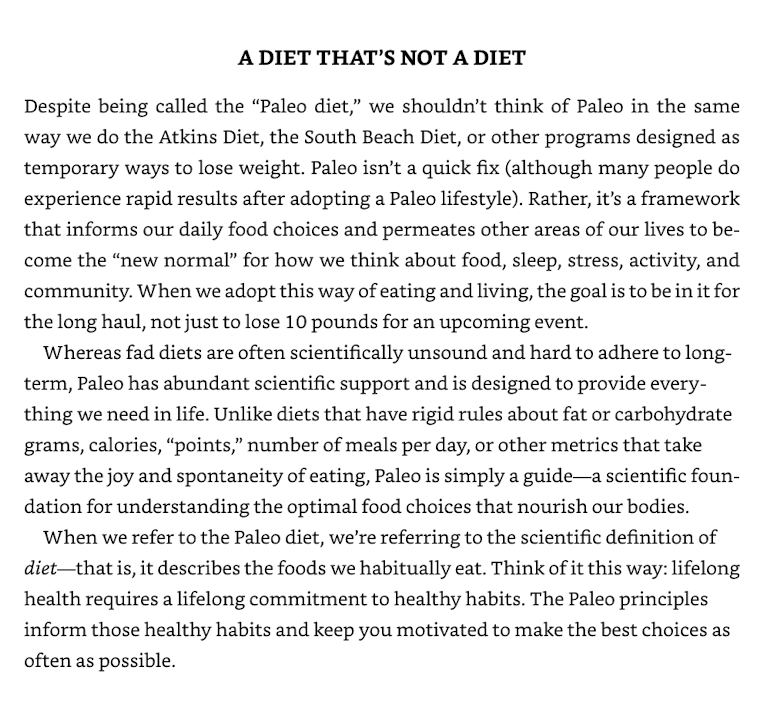
From Nutrivore, chapter 2:
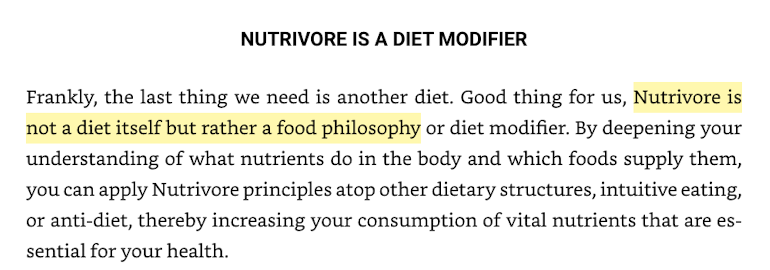
80/20 rule
Ballantyne has also used a variation of an 80/20 rule about both approaches to food.
Known as the Pareto principle, the 80/20 concept originated from an Italian economist in the late 1800s. Wellness authors have referenced the 80/20 rule (sometimes 85/15 or 90/10) so frequently that some people think this is a proven health-related theory. It's not.
Ballantyne applies the 80/20 concept to Paleo and Nutrivore differently, although the consistent use of both numbers is hard to overlook.
In Paleo Principles, the Pareto principle is defined as 80 percent of the results coming from 20 percent of the effort. The original Pareto principle noted that 80 percent of the land was owned by 20 percent of the population, highlighting factors relating to economic disparity. The specific numbers are the same, but the applications are not interchangeable.
Here’s what Paleo Principles had to say about the 80/20 rule (from chapter 31):
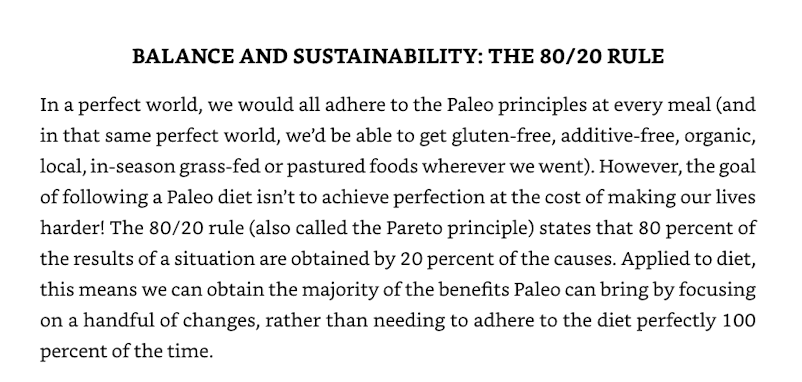
The dietary application of a handful of consistent changes being more impactful than a highly restrictive plan could be accurate, but it's still not a scientifically proven theory.
The 80/20 use in Nutrivore, though, is different. Despite the nourishment-focused messaging, this 80/20 rule seems to have a more restrictive connotation.
Here’s what Nutrivore says about the 80/20 rule (from chapter 4):
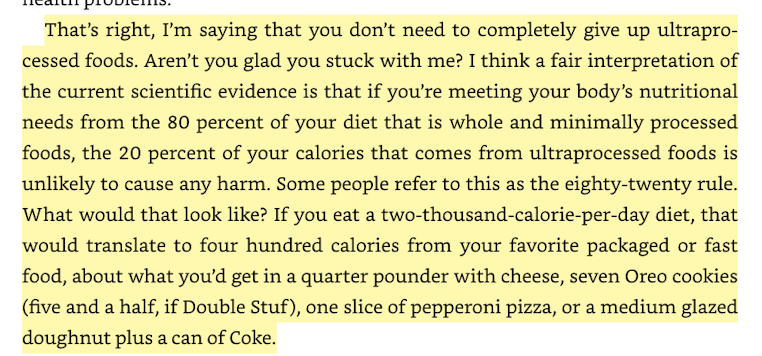
Instead of 80 percent of the benefits coming from 20 percent of the effort, the use in Nutrivore reads that 80 percent of the effort (unprocessed foods) is needed to offset 20 percent of the harm (ultra-processed foods).
It could also be read that 80 percent of the benefits (from eating better foods) won't be undone by 20 percent of the harm (consuming ultra-processed food).
Either way, the 80/20 application isn't scientific and has no citations in the book.
Summary and general considerations
- Sarah Ballantyne, PhD (medical biophysics), is a bestselling author of Paleo books and Nutrivore, a food-scoring dietary philosophy.
- Ballantyne has described Paleo and her former work as misinformation and pseudoscience but maintains an online presence on her Paleo-focused website.
- Criticisms include the development of a food-scoring system by someone without doctoral expertise in nutrition biochemistry and the fact that the plan contains elements similar to other diets.
- Nutrivore takes a much less restrictive approach to food than the author's previous works, which could benefit readers who want to transition out of more restrictive dietary approaches. However, Nutrivore also has qualities that are consistent with a dietary approach that could contribute to orthorexia (a disordered eating pattern that focuses extensively on healthy food and food quality).
- Whether they claim to be diet books or not, food-related books will always have the potential to be polarizing. Readers may gravitate to an author’s personal story or platform, which makes it hard to objectively consider nutrition-related or dietary advice (and whether someone is genuinely qualified to dispense it). They may also seek to replicate the author’s personal experience, which isn’t possible given the unique nature of each person’s health, genetics, diet, and social environment.
- Readers need to be aware that most books published for a mainstream audience are not peer-reviewed or fact-checked. They may contain anecdotes and reader success stories, but these are not equivalent to results from clinical trials. They may use many references, but citation volume alone does not make a work more rigorous.
- Diet, nutrition, health, and wellness content is emotionally charged, regardless of the perspective it comes from. But every book, article, and social media post includes direct or indirect disclaimers that what you’re reading isn’t personal or medical advice. No author or online wellness professional will assume responsibility for negative effects. For the same reason, more caution and critical thinking are warranted before giving authors or influencers credit for positive effects.
- The scientific process should allow for the development of new or shifting views in light of new evidence; experts should be given flexibility to communicate updated stances rooted in new research. The primary confusion and critique regarding the Paleo-Mom-to-Nutrivore shift is that both messages still exist simultaneously in print and online, years after the author began to view the earlier work as misinformation. Without substantially more transparent messaging on the website, Nutrivore and the Paleo Mom appear to be concurrent, complementary platforms, not a 180º shift. Maintaining a foot in both worlds could lead to concerns that business needs and revenue take precedence over remedying misinformation.
- Ballantyne clarified her planned 1-2 year process for taking down the content she has identified as pseudoscience and linked it to limitations within her current team’s capacity of six members. But when an author has self-identified their content as misinformation, it raises questions about why a more direct mode of content takedown would not be applied.
- In the current content landscape, misinformation is abundant. Much of it is perpetuated by people who may be unaware of the inaccuracies. When a scientist and bestselling author identifies their own misinformation, but does not rigorously and rapidly retract it, it is understandable that others in science communications, academic research, or healthcare might issue questions and concerns.
This article was updated on 2/17/2025 regarding the lack of changes to the Paleo Mom website and reader correspondence.
- thepaleomom.com
- https://pmc.ncbi.nlm.nih.gov/articles/PMC6892563/
- https://pubmed.ncbi.nlm.nih.gov/37772528/
- unbiasedscipod.com/ episodes/turn-the-beet-around-course-correcting-on-diet
- Influenced to Death, episode 12
